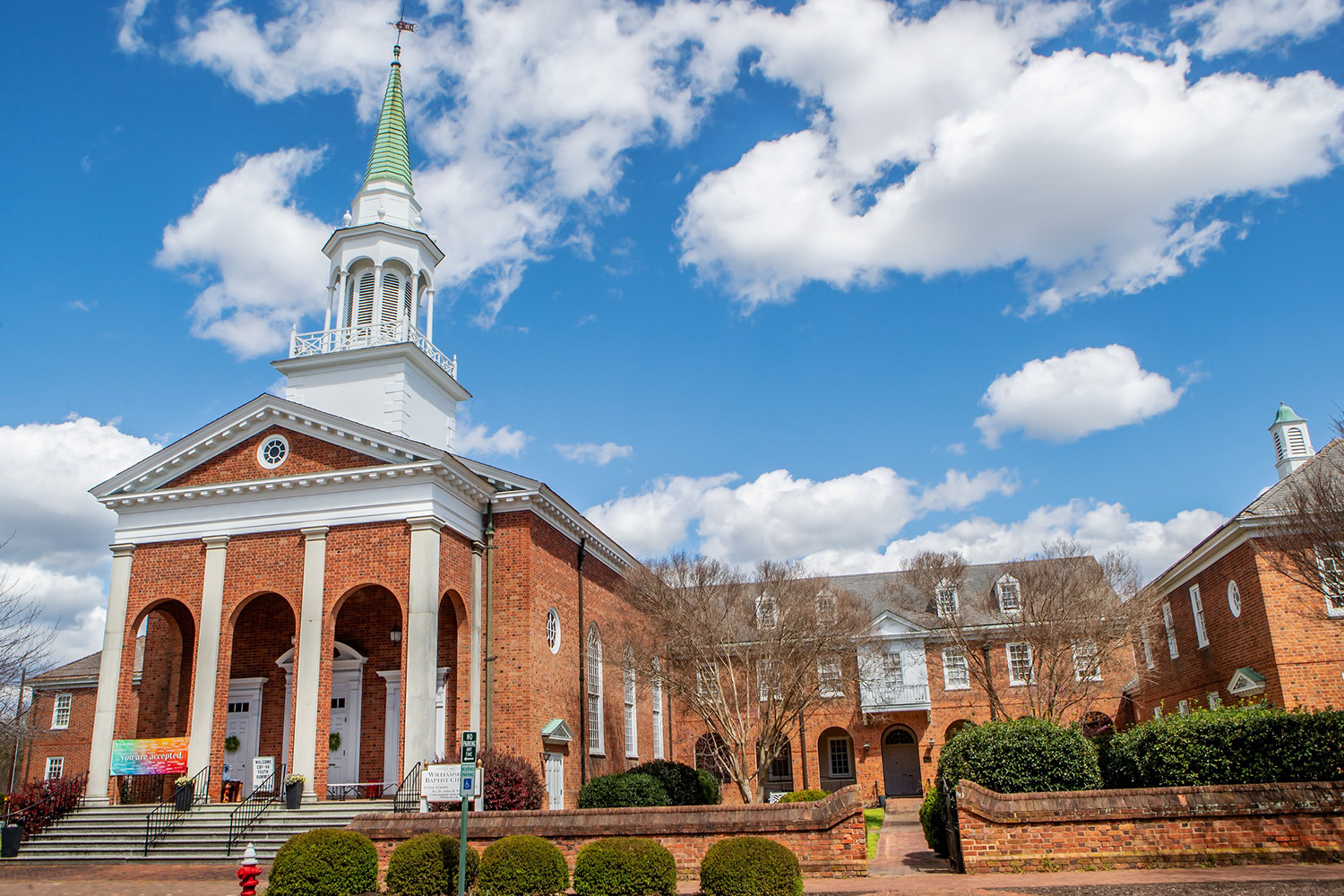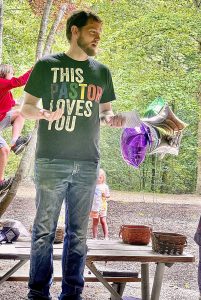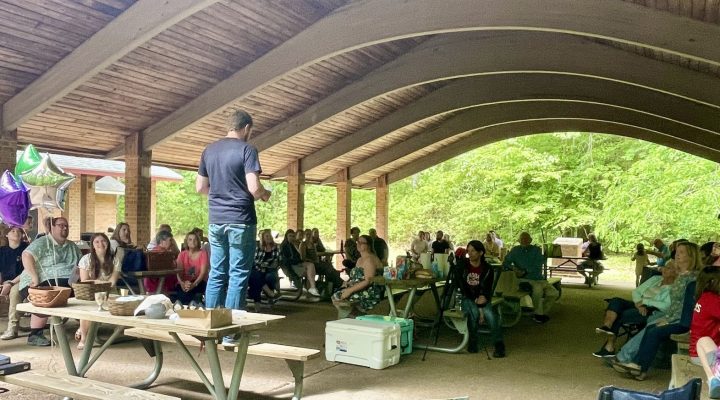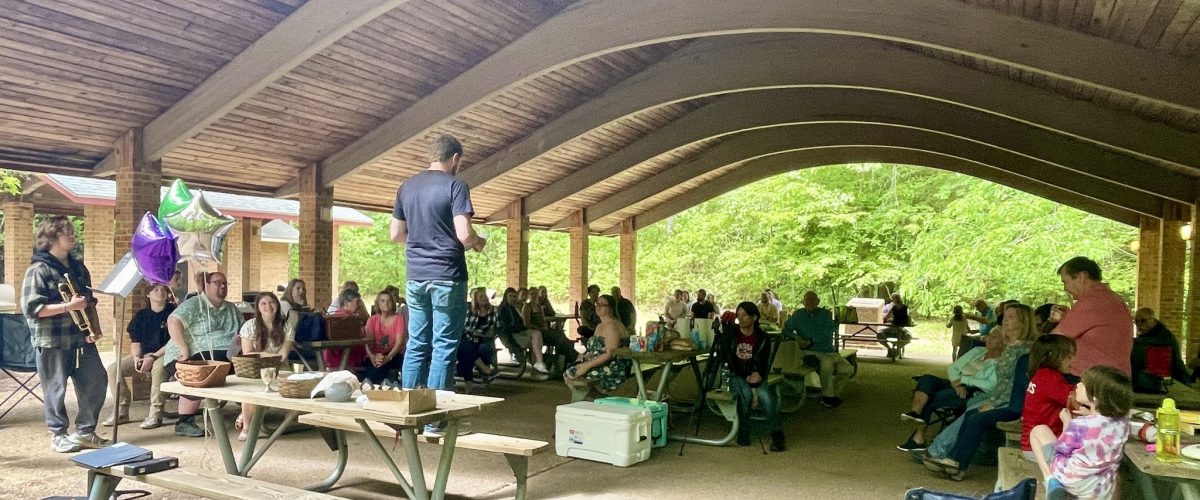What someone meant for evil, a Virginia Baptist church turned to good last weekend.
In the early morning hours of Thursday, May 4, the Williamsburg, Va., Police Department received a phone call making a threat to bomb Williamsburg Baptist Church the following Sunday. The caller used electronic voice masking and called from an untraceable spoof number.
Yet the threat was real and specific. With anti-gay references, the caller threatened to bomb the church during Sunday morning services. Williamsburg Baptist is a fully inclusive congregation that at times features a rainbow banner outside its building, which sits across the street from the College of William and Mary and just blocks from Colonial Williamsburg.

Williamsburg Baptist Church
Pastor Art Wright and other church leaders faced difficult decisions. One of those decisions was how much and when to tell members of the congregation. A bomb sniffing dog from Virginia State Police came to the church building and scoured it for threats. None were found.
However, that all clear did not absolve the potential threat for Sunday. What if a bomber got into the building Sunday morning? What if law enforcement had missed something?
Thursday morning, Wright posted an urgent message to the church on social media:
“Early this morning, the Williamsburg City Police received a bomb threat against our church. Our Building and Grounds chair, Billy Scruggs, met with local and state law enforcement at the church, and they walked in and around our entire property with a bomb-sniffing dog. The property was clear, and the police advised us that it was safe to be here. They will also walk through our property on Sunday morning before our Sunday morning activities and worship as an additional precaution. Our key leadership has been in conversation and our ushers will be especially attentive on Sunday morning, and we are in conversation with Williamsburg police about providing extra vigilance for us on Sunday, as well.”
The next day, however, a decision was made not to meet in the church building on Sunday but instead to have an all-church picnic and worship at a nearby city park. That decision was not posted on social media but was communicated privately to church members.

Pastor Art Wright speaking at the picnic
“We just decided to have a big church family picnic instead,” Wright explained. “We rented a shelter in a local park and, honestly, had more people than we have most Sundays. So it was a great fun time in the park. We had several community supporters turn out to support us, friends from Love Is Love Tidewater, which is a community LGBTQ organization. The Wesley Campus Ministry at William and Mary came to support us. We had a good show of support.”
In addition to a picnic with more food than could be eaten, the congregation held a modified worship service and even recognized graduates — an annual tradition that had been scheduled for that Sunday.
And a family of five joined the church that Sunday in the park. They already were planning to join, but seeing how the church responded to a hateful threat only strengthened their resolve, Wright reported.
Overall, the support and encouragement the church received has been astonishing, the pastor added.
“I can’t tell you how many emails and texts and Facebook messages I’ve got. It’s been so encouraging for folks to reach out — dozens of churches, community organizations from locally and across the state and across the country. We really feel supported and encouraged and prayed for.”
“We really feel supported and encouraged and prayed for.”
One of the sources of encouragement was the rabbi at the local Jewish synagogue, who offered good counsel on security measures to Wright.
“Jewish synagogues have long been targets of attacks,” the Baptist pastor noted. “And so, the rabbi sort of jokingly said to me, ‘You know, you’re one of us now.’”
Sad but true, Wright said. “Many of us have this awareness that we’re called to stand in solidarity with people who have been marginalized and oppressed. And that willingness to step into that space makes us vulnerable and puts us at risk. But we see that is something that has happened throughout history when people are willing to stand alongside and in solidarity with people who often receive threats.”
Whatever the person making the bomb threat hoped to accomplish, it backfired.
Instead of being frightened or backing down, the Baptist church strengthened its resolve for inclusion and broadened its coalition.
But the stress of the decision making was extreme, Wright said. “I don’t want to lie; it’s been a rough week.”
For now, the church is undertaking a thorough security review and making plans to be cautious while remaining welcoming.
That’s the challenge most churches face, Wright acknowledged. “Our doors are just open on Sunday mornings. We want to be open to the community. That feels like part of our mission. But we think there’s safety precautions, reasonable steps we can take to increase our safety and security on Sunday mornings.”
An irony is that most churches today are worried about shootings, not bomb threats.
The sad truth is that sharing the love of God still comes at a risk, Wright said.
“We want to increase our visibility to people who need and are seeking safe community. It’s our intention to say, ‘You are safe here. You’re welcome here.’ We have a whole host of folks who come to us and say, ‘I haven’t darkened the doors of a church in years or even decades. And I could tell upfront that I would be safe in your church.’ And so, we feel really passionate about trying to communicate from the very beginning that we’re a safe place for people.
“The unfortunate side effect is that the thing that helps us shine the light of Christ into the world visibly also attracts negative attention.”


